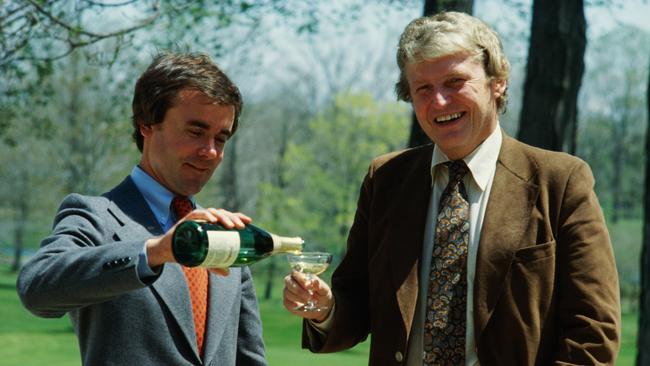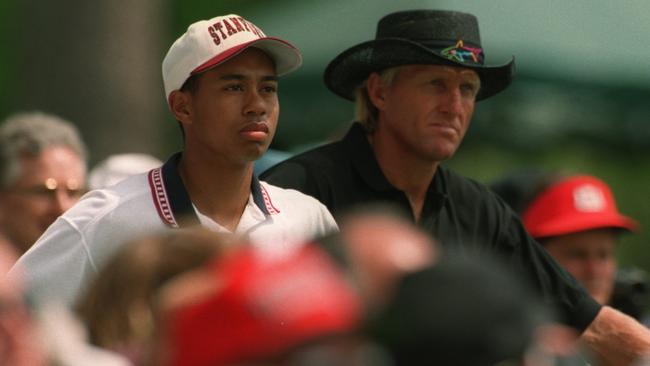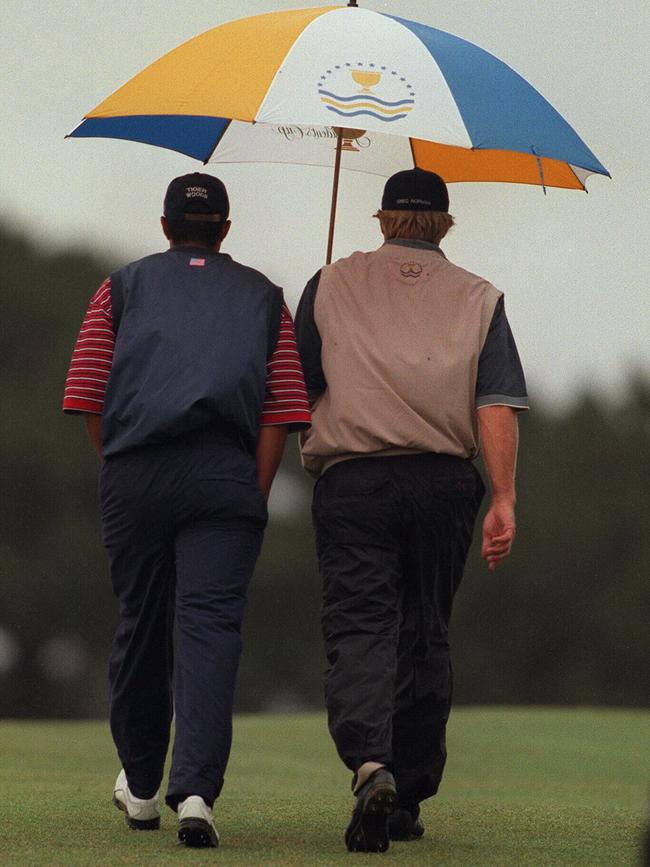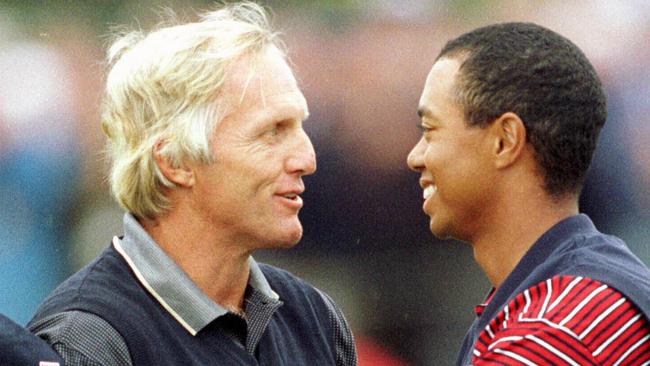‘I should have seen a shrink’: The superagent who made millions for Woods and Norman reveals all
After making millions for two of the biggest names in world sport, Hughes Norton was abruptly let go by both superstars. There was always going to be a book in it …
This is how you get fired by Tiger Woods. Hughes Norton flew to Florida in September 1998 to save his job as the star’s agent. The previous day Woods had told him he wanted to make a change. Now, after a sleepless night, the IMG man arrived at the door of the Isleworth clubhouse to find Woods standing outside. “His eyes were zombie-like,” Norton recalled. He asked if they could go inside. “We’re through,” Woods said before walking away. They have not spoken since.
It had not been any easier five years earlier when Greg Norman cut ties with him and IMG, the global sports company founded by the American lawyer Mark McCormack in 1960.
Norton says Norman had made an off-course income of $US49,979,368 (now almost $A80m) in 11 years together, but regarded himself as a better businessman.

Bitter about both bullets for years – “I should have seen a shrink” – Norton is uniquely placed to assess the two former greats who are now influencing golf’s future landscape. And after cutting the landmark $US40m Nike deal for Woods in 1996, which opened the corporate floodgates, Norton now wonders about his role in golf’s modern schism.
“As proud as I was that I earned Tiger an unprecedented $100 million in endorsement income, I see now that I was literally an agent of the wretched excess that pervades the game today,” he writes in his new biography.
Norton, 75, says he is not doing his book for money, and to be fair, he got a $US9 million severance package when McCormack sent him packing two months after Woods’s decision. His last job was to brief Mark Steinberg, his replacement.
Instead, he says it seemed the right time to write the book, half a century after joining IMG and 25 since he split with Woods. He says it is also time that people knew the truth about sports agents. Think Jerry Maguire noir.
“I did wonder if maybe I was just somebody who nobody wants to be with long term,” he says. “But with movie stars, musicians and sports figures, it’s a tenuous relationship from the start. There’s a lot of, ‘What have you done for me lately?’ Within IMG we used to say that being friends with a client maybe gave you an additional six months.”
Norton tells a compelling tale of the explosion of golf from an undervalued commodity to a lucrative theatre built on the Woods phenomenon. The parallel, and then divergent, paths taken by Woods and Norman are fascinating.
“Tiger could not have cared less about the money,” Norton says on a phone call from Ohio. “As much as Greg loved the financial success he achieved and deserved, with all the Ferraris in the garage and the Gulfstream jet, Tiger was the complete opposite. The off-course stuff was completely secondary for him. It was an intrusion into his life.”

In their first year together, there were 1545 requests for Woods’s time.
“A Nike photo shoot was a distraction from what he felt he was put on earth to do, which was to become the greatest golfer of all time,” Norton says. “The important things in his life were simple – playing golf, beating people, winning tournaments, rinse and repeat.”
Anyone wondering about the genesis of the enmity between men who spent a combined 935 weeks as the world No.1 must look back. When Woods was 14, Norton organised a game with Norman at Old Marsh Golf Club in Palm Beach Gardens. Although they were the best of their respective generations, Norton says there was no “kinship or chemistry” between the Australian and American 21 years his junior. From that day the relationship was “cool” and Norton says they are perfectly suited to their present roles, with Norman the LIV Golf commissioner and Woods a PGA Tour director.
The subtext to these character studies is the creation of a breakaway tour. Norton says we would have reached the LIV stage far earlier but for Arnold Palmer’s repeated resistance. Norman’s attempt to launch a world tour in 1994 was derailed by Palmer, but Norton says it was McCormack who first came up with the idea of a Second Tour.
Broached in 1964, it was raised again in 1976 when McCormack had corporate backing for an elite circuit of the best players, with fewer tournaments and more money. Foretelling future reasoning, he thought the “rebels” could have their cake and eat it because the majors would need the Second Tour players. Norton says Palmer again killed it at concept – “He cared about all the other players”.

When Norton mentioned McCormack’s idea to Norman, the Great White Shark was mesmerised. So what does he think now?
“Arnold Palmer knew this separate tour, this LIV stuff, would destroy golf if it went too far,” Norton says. “As for Mark, he laid out the LIV blueprint in the 1960s, but if he were here now, he would say, ‘Settle it.’ ”
Beyond all the “betrayals” and back-stabbing, Norton offers some rollicking tales. After securing the five-times major winner Byron Nelson a sunscreen deal, Norton had to grovel to get the star to forward a cheque for missing commission. When it finally arrived, it was accompanied by a note: “How do you think I shot all those low scores?”
His admiration for the ability of Woods and Norman remains undimmed. Woods scarcely needs any new praise, but Norman’s near-misses are often highlighted over his two major triumphs. Yet in 1986 he won an astonishing 11 times and, quirkily given the LIV format, led all that year’s majors after 54 holes.
Norton claims Norman never took responsibility for his failures, but also states that much of it was actually the agent’s fault. He blames Spalding’s Tour Edition ball that produced excessive backspin on Norman’s irons and says he should have got him out of that contract.
“At the time I thought Greg was so good he could figure it out,” he says. “Did he lose all those majors because of the Tour Edition ball? We’ll never know.”
Neither Woods nor Norman is spared by Norton. Of the cold, clinical manner of his sacking by Woods, Norton says: “He was like that with everyone. The same with girlfriends, the lawyer that negotiated the IMG contract.”

Norman is described as a “swaggering narcissist” and being perfectly aligned “with the motives of the Saudis: power, money and image burnishing”. Norton concludes his old charge’s legacy will be his “ill-conceived, megalomaniacal obsession with the notion of an elite world golf tour”.
However, he could better rationalise Norman sacking him. “I look back on Tiger and, frankly, no agent in sport delivered so dramatically and was then cut loose like last week’s loaf of bread.”
By the end of this layered account of human flaws, “wretched excess” and another transformative period in golf history, you will believe the modern division was a long time coming – and that a working relationship between Woods and Norman in any deal will require a heavy frost in hell.
Rainmaker: Superagent Hughes Norton and the Money-Grab of Golf from Tiger to LIV and Beyond, by Hughes Norton and George Peper, is published by Atria Books
THE TIMES




